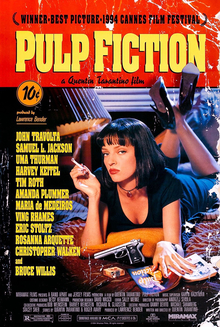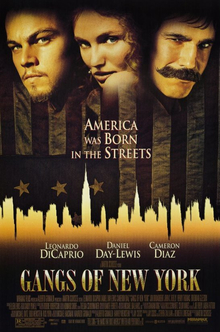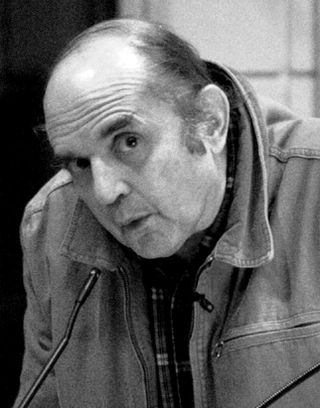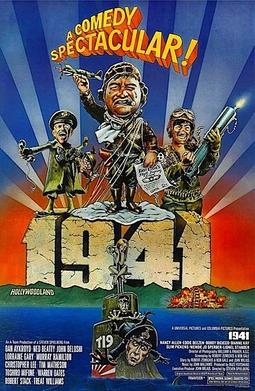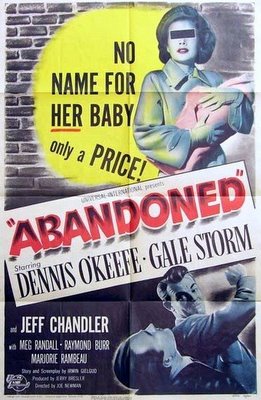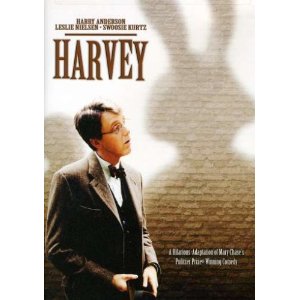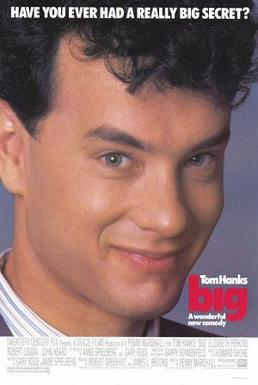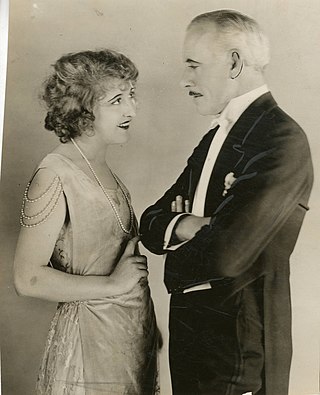Allusions
The Jimmy Stewart Museum, based in Stewart's hometown of Indiana, Pennsylvania, presents the Harvey Award to a distinguished celebrity tied to Stewart's spirit of humanitarianism. Past recipients include Robert Wagner, Shirley Jones, Janet Leigh, and Rich Little.
In the 1957 comedy film Desk Set starring Spencer Tracy and Katharine Hepburn, Hepburn's character is given a large stuffed pink bunny rabbit by her boyfriend as a Christmas present. Pointing at the gift, she asks “Aren’t you going to introduce me to Harvey?”
A 1971 children's film, Mr. Horatio Knibbles, [23] also starred a giant talking rabbit, visible only to one person.
The first episode of the 1975 television series The Invisible Man featured a scene with an invisible rabbit (wearing a visible collar) called "Harvey", in a cage in a laboratory.
The 1977 comic book story, "The Harvey Pekar Name Story," written by Harvey Pekar and illustrated by Robert Crumb, alludes to the play/film when Pekar describes how childhood acquaintances made fun of his name by calling him "Harvey the Rabbit." [24]
A scene in the 1988 film Who Framed Roger Rabbit has a barfly confessing to Judge Doom, "I seen the rabbit" (seemingly referring to Roger, who is being wrongfully sought as a murder suspect). He puts his arm around an invisible presence and says, "Well say hello – Harvey!", as a means of both mocking Doom and protecting Roger. The movie takes place in 1947, while the play was released in 1944.
In the 1989 film Field of Dreams , farmer Ray Kinsella hears a voice in his cornfield that no one else can hear. His daughter, Karin, is later shown watching a scene from Harvey on TV.
The 1992 film Memoirs of an Invisible Man sees the recently-turned-invisible Nick Holloway, afraid to reveal his identity to a sinister government agent, answer "Harvey" when asked his name.
The character Andy Dufresne in The Shawshank Redemption , released in 1994, describes "Randall Stevens" – the fake person Dufresne created to launder money – as "a phantom, an apparition, second cousin to Harvey the rabbit."
In the Farscape television series, produced by The Jim Henson Company between 1999 and 2003, the main character Crichton was often "haunted" by visual-auditory hallucinations referred to as a neural-clone of his archenemy Scorpius, produced by an interactive neurochip embedded in his brain. This character is dubbed "Harvey" and called such by Crichton in direct reference to the original film.
In the 2000 film Sexy Beast , Ray Winstone's character sometimes sees a large imaginary rabbit. [25]
In the 2001 movie A Beautiful Mind , John Nash points to an empty chair and says to his friend, "Have you met Harvey?"
The 2001 film Donnie Darko contains a six-foot tall rabbit named Frank, which haunts the titular character. Despite popular belief that this character was a reference to Harvey, Donnie Darko's writer/director Richard Kelly denies it. In an interview with Future Movies, he is quoted as saying: "I have never even seen the movie, it never occurred to me." [26] In 2002, the Aero Theatre in Santa Monica programmed Harvey and Donnie Darko as a double feature. [27]
In the series Scrubs , J.D.'s 'conscience' is his high school gym teacher in a bunny suit.
In 2004, the 15th-season episode of The Simpsons , "My Big Fat Geek Wedding" contained a similar imaginary rabbit acting as Barney's 'anti-sobriety' sponsor.
In the cartoon series Foster's Home for Imaginary Friends , the city's founder was Elwood P. Dowd.
In the 2008 video game Edna & Harvey: The Breakout , the titular protagonist has a stuffed rabbit named Harvey whom she imagines talks to her.
A British law firm was partially named after the rabbit. [28]
In the 2015 episode "Adventures in Chinchilla-sitting" in the cartoon series Bob's Burgers , character Teddy seems to spot Louise's signature bunny ears. When he turns, the ears have disappeared and he remarks, "Thought I saw Harvey."
The British indie rock band Her's included a song named "Harvey" based on the film on their 2018 debut album Invitation to Her's . Harvey was one of lead singer Stephen Fitzpatrick's favorite films. [29] [30]
In 2019, the thirteenth episode of John Green's podcast The Anthropocene Reviewed featured the film, and an essay on the film was also included in Green's book of the same title published in 2021. In the essay he describes an episode of severe clinical depression, which led to him resigning from his job, upon which his boss told him "Watch Harvey". He writes how the film helped him to get well, and that he was eventually able to return to his job at Booklist magazine. [31] [32]



